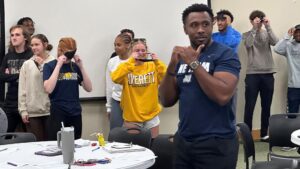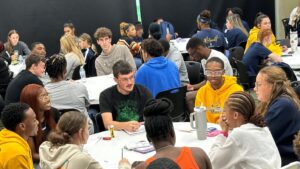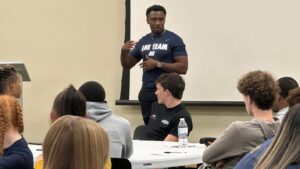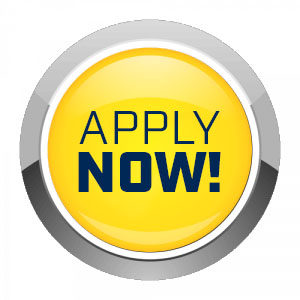By Drew Wilson/Director of Athletics Communications
“There’s so much more to life than just sports. Yes, sometimes careers are surrounded and centered around sports, but it doesn’t mean that it’s your only thing in life. … A lot of what he said is something that I’ll think about more on a day-to-day basis.” – Sophia Marshall, sophomore women’s golfer
 When college student-athletes train for hours upon hours each week for years of their lives, what happens when all that stops in a moment’s time, either because of graduation or due to injury? Former Division I football player Michael Willett helped Averett University’s student-athletes explore that discussion through multiple sessions of workshops this week.
When college student-athletes train for hours upon hours each week for years of their lives, what happens when all that stops in a moment’s time, either because of graduation or due to injury? Former Division I football player Michael Willett helped Averett University’s student-athletes explore that discussion through multiple sessions of workshops this week.
Willett, who suffered a career-ending injury while playing at the University of Central Florida, saw the need to help fellow student-athletes prepare for life after sports. The CEO of WalkOn Nation now travels to speak to student-athletes and teach them they are enhanced and not defined by being an athlete while helping them make sure they know who they are outside of their sport.
“Most people are worried about the transition and not so much here while you’re still playing,” Willett said. “That’s when you have the most resources readily available to you. Figuring out who you are so you can get those resources will help set you up for success in life, not when you’re out and it could be too late by that point.”
Willett’s program is centered around six major questions — who are you, what do you want to do, what is your purpose, what are your obstacles, why are they your obstacles and how do you overcome them?
“We do interactive things to get them up and moving, but the big thing we do is mainly get the student-athletes talking,” Willett said. “It means more when they hear it from each other than from me. … When I hear my peer going through the same thing that I’m going through, it clicks and the lightbulb goes off because I’m not alone in this. It shows you can confide in someone else like an athlete that knows your lifestyle.”
 On Monday and Tuesday, Willett met with Averett’s student-athlete population over the course of multiple sessions as part of Averett’s Department of Athletics’ professional development programming.
On Monday and Tuesday, Willett met with Averett’s student-athlete population over the course of multiple sessions as part of Averett’s Department of Athletics’ professional development programming.
“It was pretty eye-opening,” said senior Said Bangura, who is a member of the Averett women’s track and field and cross country programs. “I always saw myself as an athlete, too. And I did see myself as other things but I didn’t really realize the importance of seeing myself as those other things, especially when college is finished because I graduate in May. It makes me want to go out and keep networking even more.”
Willett facilitated conversations within the group in each session to help them talk about fears or other barriers.
“I like real-life examples,” Willett said. “I’m not big on sugar-coating. I like telling them how it is because sugar-coating isn’t good for no one, especially athletes. We need constructive criticism the right way.”
Hunter Crute, a junior on the men’s golf team, said thinking about life beyond sports is something that his dad has talked to him about multiple times. Willett’s workshop hammered home that point.
“I learned that there is a greater outlook,” Crute said. “Even though I play a college sport now, in five years that’s not really going to matter.”
Sophia Marshall, a sophomore on the women’s golf team, said even before attending her designated session, she had heard from other friends how enlightening the workshop was for her peers who had already attended.
“I thought this workshop was really awesome,” Marshall said. “I think that a lot of the times when coaches or administrators tell us to go to these types of things, we’re not as excited or enthusiastic because it is usually just people talking at us. Sometimes it doesn’t really resonate with us personally. I’ve talked to people who did [this workshop] before me that it really sparked something in them. I think it’s really important with all the aspects that he covered, especially the mental health aspects and everything past college because a lot of sports you can’t play once you’re older.
“There’s so much more to life than just sports,” Marshall added. “Yes, sometimes careers are surrounded and centered around sports, but it doesn’t mean that it’s your only thing in life. … A lot of what he said is something that I’ll think about more on a day-to-day basis.”
One of the activities within each hour-long session that Willett had each group do was put people in groups of two and have one person be blindfolded. From across the room, the other person had to help the blindfolded person navigate their way to them. It sounds simple, until the 12 tables, nearly 100 chairs and 50 other voices screaming out directions in Averett’s MPR space provide challenges.
“I really feel like the blindfold activity really gave everybody a better outlook on how to look at something when it’s coming from a broader scale like hearing from different voices,” said Jason Sellars II, a senior on the men’s basketball team. “You’re in a room surrounded by your peers and you’ve got to listen to who I’ve got to go to. It could be hard at times, and that really relates to life in certain ways and certain aspects because most of the time you’re not going to know where that voice is but you’ve still got to find your way, calm down and maneuver your way around things.”
 Willett said his visit to Averett has shown him how much the university and administration care about its student-athletes.
Willett said his visit to Averett has shown him how much the university and administration care about its student-athletes.
“I’m even wearing the shirt that says ‘One Team’ because I can see within the student-athletes that it’s a family here,” said Willett, referring to the Averett Athletics T-shirt bearing the department’s motto that he was wearing on Tuesday. “At most universities, you don’t get that family environment. They preach family, but they don’t show family. Here, it is that and the athletes show that with how they carry themselves, the questions they ask and even coming up after to shake hands. Most student-athletes don’t do that. It’s embedded in the university from the top down. This university cares and its unique how much they care about their student-athletes and it shows.”
Sellars said he’ll definitely take what he learned and apply it moving forward.
“I really feel like this was a great event to tell student-athletes about the other side of being an athlete gearing toward mental health and mental sustainability and seeing who you are outside of being an athlete. Today I really feel I gathered the social materials. Of course, I’ve always looked like myself outside of being an athlete as me as a person, but I really feel like I gained more knowledge about things to do and things for the future that I’m going to need.”
